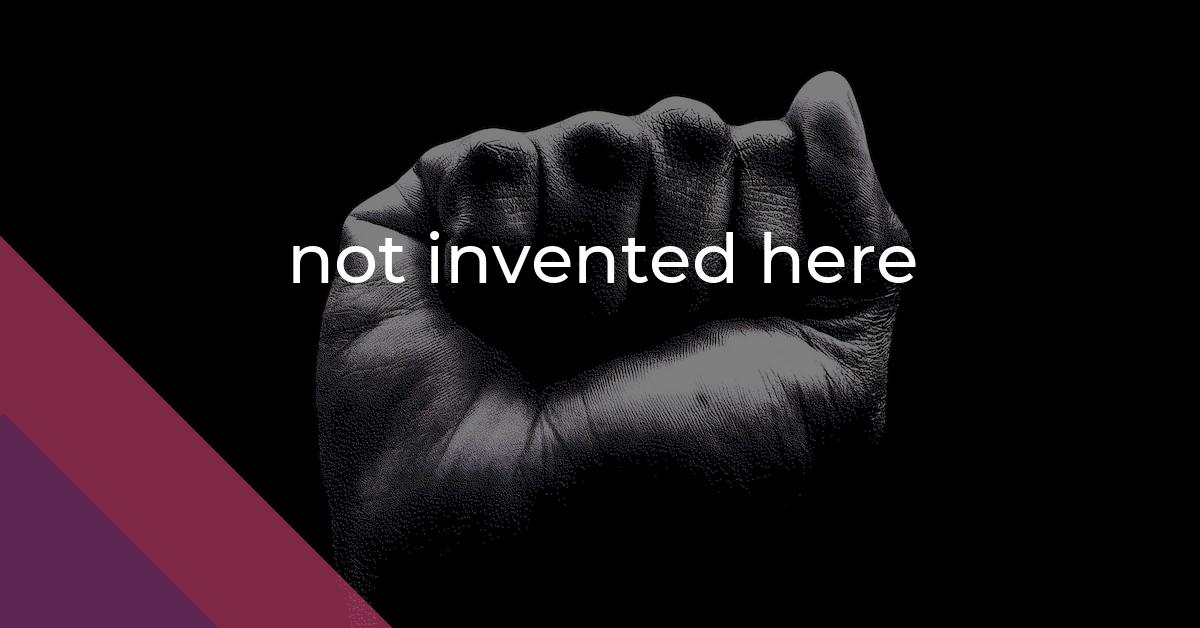not invented here: Idiom Meaning and Origin
What does ‘not invented here’ mean?
The idiom "not invented here" means a tendency to reject ideas or solutions that are developed externally and favor those that originate internally. It conveys a resistance to accepting innovations or suggestions from outside sources.

Idiom Explorer
The idiom "set in one's ways" refers to someone who is resistant to change and prefers to stick to their established habits, beliefs, or routines.
The idiom "road less traveled" means choosing an unconventional path or taking a less popular route, often in life or decision-making, different from the majority or mainstream choices.
The idiom "reinvent the wheel" means to waste time and effort by attempting to create or do something that already exists or has been done before.
An idiom meaning to improvise or make up something without any basis or evidence.
The idiom "outside the box" refers to thinking or approaching a problem in a creative or unconventional way, outside of normal or traditional boundaries. It encourages innovative and original thinking that goes beyond the usual limitations or constraints.
The idiom "out of the box" means to think in an unconventional or innovative way, beyond traditional boundaries or norms.
The idiom "out of one's box" means to be acting in an unconventional or unexpected way, deviating from one's usual behavior or habits.
The idiom "out of nowhere" means something unexpectedly or suddenly appearing without any prior indication or warning.
The idiom "other head" means having a different opinion or perspective, often resulting in conflict or disagreement.
The idiom "on the outside, looking in" means to be excluded or feel excluded from a group or activity, typically observing it from a distance and feeling a sense of isolation or being left out.
Revealing Origin
The idiom "not invented here" reflects a common attitude or mindset that many individuals and organizations possess. It implies a resistance to accepting or adopting ideas, products, or solutions that come from outside one's own group or organization. Essentially, it's the idea that if it wasn't created by us, it must not be worth considering. This mindset can hinder growth, innovation, and collaboration in various domains. Overcoming this bias requires a shift in mindset and a willingness to embrace diverse perspectives and ideas.
The origins of the idiom "not invented here" can be traced back to the mid-20th century, although its specific source or creator is unknown. It likely emerged naturally in the English language as a way to describe the tendency for individuals and groups to favor ideas they generate themselves over ideas from external sources. This bias is known as ingroup favoritism or intergroup bias, which refers to the preference for members of one's own group and the perceived superiority of internally generated ideas or solutions.
This mindset can manifest in different ways in terms of mindset and organizational culture. It can lead to reluctance to collaborate with other teams, dismissal of suggestions from colleagues, and resistance to outside expertise and knowledge. These behaviors can hinder growth, innovation, and the ability to adapt to changing circumstances.
In the business world, the "not invented here" mentality can have negative impacts on product development, market expansion, and competitive advantage. It can lead to missed opportunities for growth and innovation as well as hinder the ability to stay ahead of the competition. Similarly, in academia, this mindset can hinder interdisciplinary collaboration and impede the progress of research. By limiting the exploration of alternative approaches or solutions, the idiom "not invented here" can create barriers to problem-solving and inhibit academic progress.
Even in the realm of politics, the "not invented here" mentality can be detrimental. When there is resistance to considering ideas or solutions from outside one's own political party or ideology, it creates a divisive atmosphere. This can hinder progress towards solving complex problems and limit the ability to find common ground or reach bipartisan agreements.
Addressing the "not invented here" mentality requires a shift in mindset and a conscious effort to overcome ingrained biases. One important step is to embrace diversity of thought and promote open communication. By fostering a culture of collaboration, organizations and individuals can overcome the resistance to considering ideas from outside sources. Recognizing the value of external ideas and expertise is key to fostering innovation, growth, and improved problem-solving capabilities.
When faced with the idiom "not invented here", it is important to remember the related idioms that provide deeper insights into this mindset. For example, the phrase "have other ideas" implies that individuals or groups may possess their own unique perspectives and solutions to a problem. Taking the time to listen and consider these other ideas can lead to new and innovative approaches.
Another related idiom is "outside the box". This expression encourages individuals to think creatively and consider ideas or solutions that are unconventional or outside the norm. By stepping outside of the "invented here" bubble, new possibilities can be explored and innovative solutions can be discovered.
The idiom "out of the box" is similar to "outside the box" and also encourages thinking beyond the established norms. It suggests that ideas or solutions that are not traditionally considered may be the key to solving a problem or achieving a goal. By expanding our thinking and being open to ideas from outside sources, we can break free from the limitations of the "not invented here" mindset.
Lastly, the idiom "not grow on trees" emphasizes the scarcity of valuable ideas or solutions. It reminds us that innovative and effective ideas are not always easy to come by. By recognizing this, we can appreciate and value ideas that come from outside sources, even if they are not our own. This can help overcome the resistance to considering ideas that were not internally generated.
The idiom "not invented here" reflects a mindset that favors internally generated ideas over externally sourced ones. Overcoming this bias requires a shift in mindset and a willingness to embrace diverse perspectives and ideas. By understanding the origins and implications of this idiom, we can gain insights into human behavior and the challenges of fostering a culture of innovation and collaboration. By incorporating related idioms such as "have other ideas", "outside the box", "out of the box", and "not grow on trees" into the discussion, we can further explore the importance of considering ideas from outside sources and the potential benefits of doing so.
Example usage
Examples of how the idiom "not invented here" can be used in a sentence:
- We shouldn't dismiss their idea just because it's "not invented here."
- The team's resistance to new technology is rooted in a strong "not invented here" mentality.
- The company's failure to collaborate with others is a result of their "not invented here" mindset.
"Not invented here" is commonly used to refer to the tendency of individuals or organizations to reject or dismiss ideas, products, or solutions that are developed externally, simply because they were not created internally. It implies a bias towards favoring internally developed or homegrown solutions over external ones. This mindset can be detrimental to innovation and collaboration, as it often limits the ability to benefit from outside expertise or alternative perspectives.
More "Origins" idioms



